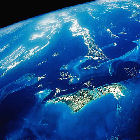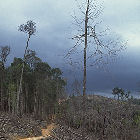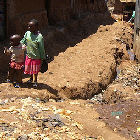By: Yojana Sharma
Send to a friend
The details you provide on this page will not be used to send unsolicited email, and will not be sold to a 3rd party. See privacy policy.
Yojana Sharma describes various proposals for a new panel to monitor progress towards sustainable development after Rio+20.
[LONDON] One of the most likely outcomes of the UN Conference on Sustainable Development (Rio+20) taking place in Brazil in June will be a high-level intergovernmental panel charged with monitoring the planet's progress towards sustainability.
A key function of the panel, which seemed to be gathering support at a meeting held in New York last month (25–27 January) to discuss the outcome of conference, will be to inject more science into the political discussion of how to achieve sustainability.
But, with several competing proposals on the table, it is not clear what form such an intergovernmental panel would take. What would its mandate be? And how would it include developing countries, which may have less scientific expertise than developed countries but just as much stake in the panel's activities and outcomes?
Some believe that a scientific panel should be restricted to preparing regular 'state of the planet' assessment reports. A top-level advisory committee to the UN last week proposed setting up a board to give science advice to the UN secretary-general.
Others are pushing for a full intergovernmental panel comparable to — and perhaps responsible for — the Intergovernmental Panel on Climate Change (IPCC). And some favour a combination of these ideas.
Politically, any proposal will need to both assure developing countries that their voices will be heard, and meet the concerns of developed countries regarding costs and bureaucracy. All these issues are likely to surface at the next round of negotiations in New York next month (19–23 March).
A flurry of proposals
The starting point for negotiations has been the first draft of the Rio+20 outcome document, known as the 'zero draft'. This flags up the need for regular 'state of the planet' reviews and calls on the UN secretary-general to coordinate such assessments, although it does not specifically mention an intergovernmental panel.
"The zero draft is now accepted material for negotiations of the Rio+20 outcome," says Gisbert Glaser, a senior advisor at the International Council for Science (ICSU), one of the coordinators of the Scientific and Technological Community 'major group' at Rio+20 negotiations.
One proposal that goes significantly further than the zero draft is a global sustainability panel to advise the UN, an idea endorsed by the UN secretary-general's high-level panel in a report published last week (30 January).
The panel, including politicians from both developed and developing countries, states the need for a global scientific initiative to strengthen the interface between policy and science. This would produce assessment reports "in the context of sustainable development", including socio-economic analyses.
 The panel could produce regular 'state of the planet' reports
Flickr/s3rgio.e
The panel could produce regular 'state of the planet' reports
Flickr/s3rgio.e
A separate proposal, which is gathering support from developing countries and non-governmental organisations (NGOs), is the creation of an Intergovernmental Panel on Sustainable Development, along the lines of both the IPCC and the recently-established Intergovernmental Platform on Biodiversity and Ecosystem Services (IPBES).
This proposal, put forward by Indonesia last July, is backed for example by the Stakeholder Forum, a civil society pressure group that is tracking the Rio+20 negotiations. It goes further than the zero draft's call for 'state of the planet' assessments to include a broader assessment of what sustainable development means for people.
This is an important addition if developing countries are to support the proposal. They say that concerns about sustainable development should not just be about environmental damage and resource depletion, but should include ideas about how a country can develop both socially and economically while preserving its environment.
The Stakeholder Forum suggests that such a panel could be modelled on the IPCC, bringing together representatives from the scientific and political communities. It could oversee both the IPCC and IPBES, as well as future panels, although the structure would need to be agreed.
The purpose of the panel would need to be clear, says Farooq Ullah, head of policy and advocacy at the Stakeholder Forum. For example, would it do its own research or consolidate the research of others?
Global sustainability versus sustainable development
A separate proposal — supported by parts of the scientific community — comes from the European Union, and calls for a "mechanism for international research cooperation on major sustainable development challenges", working alongside the IPCC and IPBES rather than overseeing them.
Another idea, being promoted by a broad coalition of scientific organisations under the banner of the Future Earth initiative, is to create an Intergovernmental Panel on Global Sustainability (IPGS), which would carry out regular assessments of the state of the planet.
An IPGS would bring together "and expand upon existing assessments [such as those done by the IPCC], strengthening links between science and policy", according to the Future Earth initiative, which will be launched at the Planet Under Pressure conference in London, United Kingdom, next month (26–29 March).



The 'global sustainability' of this proposal is distinct from the 'sustainable development' of the Indonesian submission: one focuses on the state of the planet, the other on the process of development. The IPGS would also be broader in scope, and have a role closer to the wording of the zero draft.
Another difference, however, is that while the impact of sustainable development is central to the Indonesian proposal, in the Future Earth proposal it is just one aspect. This could make it harder for developing countries to support it, diplomats suggest.
Sybil Seitzinger, executive director of the International Geosphere–Biosphere Programme, which backs the Future Earth proposal, says: "We don't just need an assessment of the planet, we need to develop this panel and give it a new suite of tools [such as the ability to do early warnings and provide socio-economic impacts to policymakers] that are easy for decision-makers to use, but based on strong science."
The proposal does not mean abolishing the IPCC or IPBES, she says. "But we need to look at the world from a more integrated perspective".
She also suggests that a global sustainability panel should include and advise a broad range of institutions. "We need to think of [including] major financial institutions, such as the World Trade Organization, the International Monetary Fund and beyond, as well as NGOs that have big stakes in ensuring global sustainability," she says.
The creation of any intergovernmental panel to monitor global progress towards sustainability would inevitably raise the issue of government influence, and how it might affect the presentation of scientific data.
"But it also has advantages because governments are involved in the co-production of knowledge," says Frank Biermann, chair of the Earth System Governance Project, a network of researchers specialising in global environmental change management, which is providing input to various proposals.
Scientific knowledge produced without government engagement "might not be taken seriously by governments later on", he suggests.
Getting developing countries on board
Not all the proposals are mutually exclusive, and some might merge along the way, diplomats say.
Glaser points out that ICSU has been involved in developing several proposals, as "the best mechanism may not necessarily be the one that gets the most political support". ICSU says it wants the best science, but that proposals should include clauses relevant to developing countries.
"The EU proposal is supported by a very strong group of countries, and we have also lent our support to this idea of a global mechanism. But we are not in a position at this stage to single out one or two [proposals] and say they are our favourites," says Glaser.



The United States and Canada oppose any panel with significant bureaucracy and high administrative costs, pointing to the IPCC's operating costs of US$12–13 million a year.
Seitzinger argues that this is "not a large amount of money compared to the cost savings that this type of science-based information would provide" and it would identify cost-effective areas for investment.
Many countries, particularly in the South, have not shown their hand on the type of panel they would support.
Biermann points out that developing countries will only back a body if it makes them feel adequately represented.
"But you also have huge imbalances in scientific resources between countries," he says, adding that geographic balance may not lead to the best scientific judgements.
Despite the many challenges that it presents, the idea of an intergovernmental panel with a strong scientific role is gaining traction. In New York last month, "people were beginning to consolidate around this idea", says Ullah of the Stakeholder Forum.
Many issues remain to be resolved, from whether to focus on global sustainability or sustainable development, to ensuring an appropriate balance between political and scientific representation.
But with four months to go before Rio+20, both NGOs and the scientific community are optimistic that an acceptable solution can be found.
More on Capacity building


Script media release
Journalists offered ‘big break’ mentoring opportunity from Radio Nigeria
03/04/19












